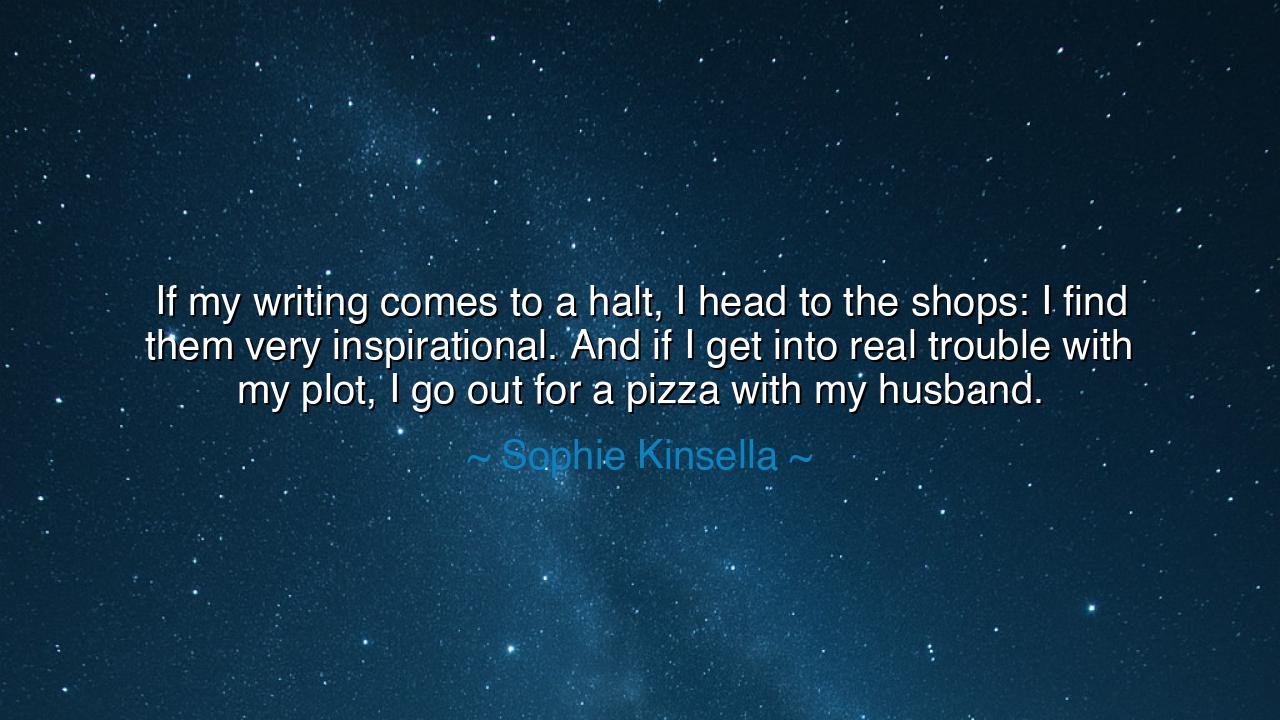
If my writing comes to a halt, I head to the shops: I find them
If my writing comes to a halt, I head to the shops: I find them very inspirational. And if I get into real trouble with my plot, I go out for a pizza with my husband.






In the words of Sophie Kinsella, the teller of tales woven with humor and human frailty, we find a curious confession: “If my writing comes to a halt, I head to the shops: I find them very inspirational. And if I get into real trouble with my plot, I go out for a pizza with my husband.” This saying, light in tone yet deep in meaning, speaks to the ancient rhythm between creation and rest, inspiration and life. For even the greatest fires of the mind require the gentlest winds of ordinary living to rekindle their glow.
Long have the sages known that inspiration does not always dwell within the temple of silence. The poet may climb the mountain seeking revelation, but the divine whisper often comes not amid thunder, but in the laughter of the marketplace. When Kinsella leaves her pen to wander among the shops, she returns not as an escapee from her art, but as a seeker of fresh air for her soul. For in the faces of strangers, the colors of garments, and the chatter of the crowd, she finds the pulse of human life — the very essence that gives breath to her stories.
There is ancient wisdom in this. Consider Archimedes, who, in the bathhouse of Syracuse, found the principle that would echo through eternity. He did not find it hunched over scrolls or trapped in study — he found it in the simplicity of living, in the humble act of bathing. Likewise, when the artist steps away from her desk to live, she is not abandoning creation; she is surrendering to it. For creativity, like a wild bird, often alights when we are not watching.
And when the struggle grows deeper — when the mind entangles itself in the snares of its own making — Kinsella does not despair. She turns to the comfort of companionship, breaking bread and sharing laughter with her husband over a humble pizza. This act, small as it seems, is the very heart of renewal. For in human connection lies a secret power: to untie the knots of the mind through warmth, humor, and love. The ancients called it philia, the friendship that steadies the spirit and restores balance to the soul.
In the life of Leonardo da Vinci, too, we see this sacred dance between focus and release. When frustrated by his unfinished paintings, he would wander the streets of Florence, sketching faces, studying flight, or simply observing the play of light upon water. To others, it looked like distraction; to him, it was nourishment. It was in these wanderings that his genius ripened, for life itself was his teacher. So too does Kinsella remind us that art grows best when watered by the joys and trivialities of the everyday.
Let us, then, learn from her example. When our work becomes heavy, when thought turns rigid and the well of inspiration runs dry, let us not despair or force the mind beyond its limits. Instead, let us step into the world. Walk among people. Taste the bread of laughter. Listen to the song of life humming through the streets. For inspiration is not found by chasing it, but by living fully enough to receive it.
The lesson, dear listener, is this: balance is the secret of creation. To labor and to rest, to strive and to wander, to think and to feel — these are the twin wings that lift the human spirit. If one grows weary, the other must rise to carry it. Therefore, when your own craft falters, remember Sophie Kinsella’s wisdom. Step away, live a little, love a little, laugh a little — and when you return to your work, you shall find that the flame, once dimmed, burns brighter than before.






AAdministratorAdministrator
Welcome, honored guests. Please leave a comment, we will respond soon